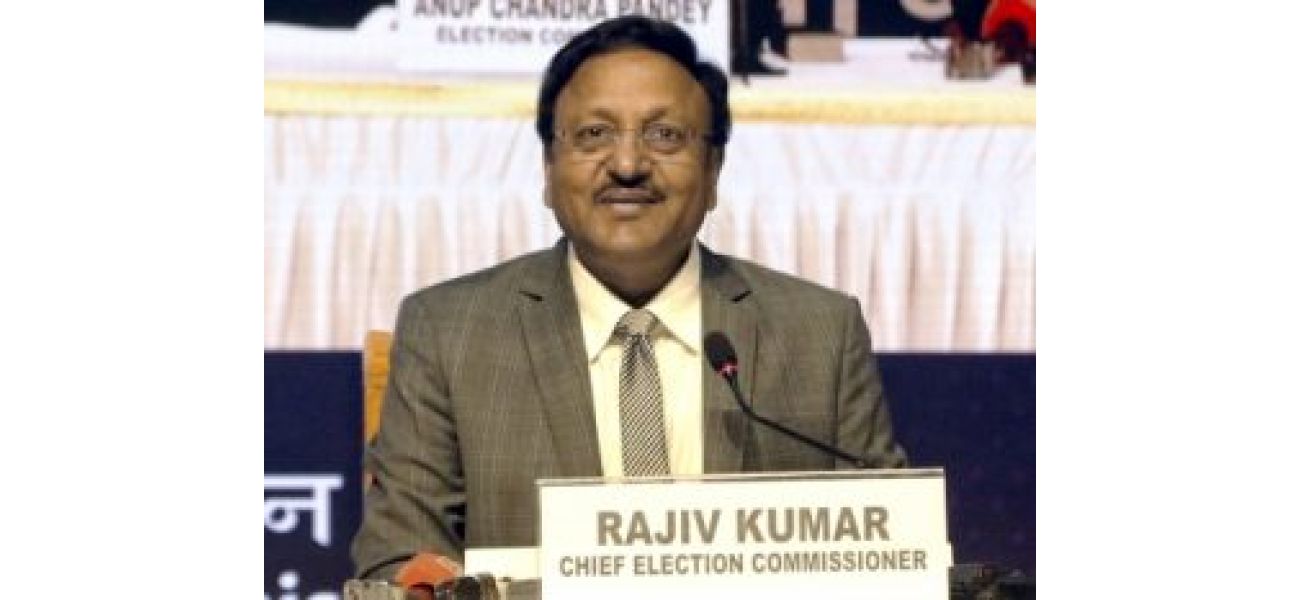Rajiv Kumar steps down as Chief Election Commissioner after conducting LS and J-K elections.
Rajiv Kumar is stepping down as the chief election commissioner of India after a successful three-year term, but also faced accusations of partisanship.
February 18th 2025.

Rajiv Kumar, the 25th chief election commissioner, is stepping down from his position on Tuesday after serving for almost three years. During his tenure, he successfully oversaw the 2024 Lok Sabha elections and the crucial Jammu and Kashmir assembly polls, which were marked with high electoral successes. However, his term was not without challenges as he faced repeated allegations of bias by opposition parties.
Kumar joined the Election Commission on September 1, 2020, as an Election Commissioner and later assumed charge as the CEC on May 15, 2022. He has served the EC in various capacities for about four-and-a-half years. During his time with the EC, Kumar implemented reforms across different aspects of its functioning, including structural, technological, capacity development, communication, international cooperation, and administration.
Under Kumar's leadership, the EC successfully conducted elections in 31 states and union territories, including the Presidential and Vice Presidential elections in 2022, Lok Sabha elections in 2024, and Rajya Sabha polls. However, his tenure was marred by criticism from opposition parties and activists on various issues, such as the efficacy of Electronic Voting Machines, alleged manipulation of voter data, and bias towards the ruling BJP.
In response to these allegations, the Commission rejected them in writing. However, Kumar also took a more creative approach by using poetry to defend himself and the poll authority. When he was accused of being lenient towards the ruling party to secure a post-retirement job, Kumar announced that he would go on a six-month retreat in the deep Himalayas to "detoxify" himself.
On his last day in office, Kumar expressed his confidence in the capabilities of his successor, Gyanesh Kumar, who was announced by the government on Monday night. He also stated that the Indian voters will continue to support the Commission wholeheartedly.
In his interactions with the media, Rajiv Kumar often questioned the timing of petitions raised against the EC. He believed that these petitions were filed just before an election to discredit the Commission and the entire electoral process. In his farewell address, Kumar mentioned that he has observed a pattern in the timing of these petitions, and urged the courts to schedule hearings with consideration to the election period to ensure a smooth and undisturbed electoral process.
Kumar also highlighted the Commission's commitment to addressing concerns regarding promises of unchecked freebies and overpromising manifestos. He stated that while the matter is currently sub-judice, it is essential that political promises are backed by clear disclosures on their financial viability and impact on the state's fiscal health.
During the COVID-19 pandemic in 2021, Kumar, as election commissioner, had drafted an affidavit stating that the courts may punish him if he was in the wrong, but they should absolve the EC of any doubts. This affidavit was intended to be filed before the Madras High Court and the Supreme Court but could not be submitted. It was in response to an observation by the Madras HC that held the EC solely responsible for the COVID surge in Tamil Nadu due to the assembly polls.
Kumar was also vocal about the flaws in the exit poll process and news channels' coverage of early trends during vote counting. He referred to the practice of showing early trends as "nonsense" and stated that it creates a distraction and raises expectations. He urged the media, especially electronic media, to introspect and ensure full disclosure of sample size, survey location, and results.
Before joining the Election Commission, Kumar served as the Chairman of the Public Enterprises Selection Board in August 2020. He was also the Union Finance Secretary from July 2019 to February 2020, Secretary of Financial Services from September 2017 to July 2019, and Establishment Officer from March 2015 to June 2017. Kumar, who belongs to the Indian Administrative Service of Bihar/Jharkhand cadre of the 1984 batch, retired from government service in February 2020.
During his tenure as CEC, Kumar successfully carried out delimitation of Parliamentary and Assembly constituencies in Assam. He achieved this by bringing together various stakeholders with conflicting viewpoints and interests and fostering an inclusive, participative, and representative approach.
Kumar joined the Election Commission on September 1, 2020, as an Election Commissioner and later assumed charge as the CEC on May 15, 2022. He has served the EC in various capacities for about four-and-a-half years. During his time with the EC, Kumar implemented reforms across different aspects of its functioning, including structural, technological, capacity development, communication, international cooperation, and administration.
Under Kumar's leadership, the EC successfully conducted elections in 31 states and union territories, including the Presidential and Vice Presidential elections in 2022, Lok Sabha elections in 2024, and Rajya Sabha polls. However, his tenure was marred by criticism from opposition parties and activists on various issues, such as the efficacy of Electronic Voting Machines, alleged manipulation of voter data, and bias towards the ruling BJP.
In response to these allegations, the Commission rejected them in writing. However, Kumar also took a more creative approach by using poetry to defend himself and the poll authority. When he was accused of being lenient towards the ruling party to secure a post-retirement job, Kumar announced that he would go on a six-month retreat in the deep Himalayas to "detoxify" himself.
On his last day in office, Kumar expressed his confidence in the capabilities of his successor, Gyanesh Kumar, who was announced by the government on Monday night. He also stated that the Indian voters will continue to support the Commission wholeheartedly.
In his interactions with the media, Rajiv Kumar often questioned the timing of petitions raised against the EC. He believed that these petitions were filed just before an election to discredit the Commission and the entire electoral process. In his farewell address, Kumar mentioned that he has observed a pattern in the timing of these petitions, and urged the courts to schedule hearings with consideration to the election period to ensure a smooth and undisturbed electoral process.
Kumar also highlighted the Commission's commitment to addressing concerns regarding promises of unchecked freebies and overpromising manifestos. He stated that while the matter is currently sub-judice, it is essential that political promises are backed by clear disclosures on their financial viability and impact on the state's fiscal health.
During the COVID-19 pandemic in 2021, Kumar, as election commissioner, had drafted an affidavit stating that the courts may punish him if he was in the wrong, but they should absolve the EC of any doubts. This affidavit was intended to be filed before the Madras High Court and the Supreme Court but could not be submitted. It was in response to an observation by the Madras HC that held the EC solely responsible for the COVID surge in Tamil Nadu due to the assembly polls.
Kumar was also vocal about the flaws in the exit poll process and news channels' coverage of early trends during vote counting. He referred to the practice of showing early trends as "nonsense" and stated that it creates a distraction and raises expectations. He urged the media, especially electronic media, to introspect and ensure full disclosure of sample size, survey location, and results.
Before joining the Election Commission, Kumar served as the Chairman of the Public Enterprises Selection Board in August 2020. He was also the Union Finance Secretary from July 2019 to February 2020, Secretary of Financial Services from September 2017 to July 2019, and Establishment Officer from March 2015 to June 2017. Kumar, who belongs to the Indian Administrative Service of Bihar/Jharkhand cadre of the 1984 batch, retired from government service in February 2020.
During his tenure as CEC, Kumar successfully carried out delimitation of Parliamentary and Assembly constituencies in Assam. He achieved this by bringing together various stakeholders with conflicting viewpoints and interests and fostering an inclusive, participative, and representative approach.
[This article has been trending online recently and has been generated with AI. Your feed is customized.]
[Generative AI is experimental.]
0
0
Submit Comment





